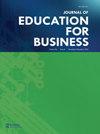How do location, accreditation, and faculty size affect business schools’ ranking?
IF 0.7
Q2 EDUCATION & EDUCATIONAL RESEARCH
引用次数: 0
Abstract
AbstractThis study analyzed the impact of location, accreditation, and faculty size on the ranking of elite business schools. It used descriptive statistics and inferential analysis (analysis of covariance) to establish the effect of location on the business schools’ ranking while also controlling the influence (impact) of the covariates (accreditation and faculty size) on the outcomes. It found that location and accreditation type do not significantly affect the business schools’ ranking. The size of the faculty impacted the rankings of the programs. However, the pairwise comparison of the critical factors shows that faculty size and accreditation are more impactful in European business schools than in China, the United States/Canada, and other regions. Finally, smaller business schools (mainly in Europe) pursue Triple Crown accreditation to compete with more extensive, U.S.-based programs, favoring only the Association to Advance Collegiate Schools of Business accreditation.Keywords: Accreditationbusiness schoolsfacultylocationrankings地理位置、认证和师资规模如何影响商学院的排名?
摘要本研究分析了地理位置、认证和师资规模对精英商学院排名的影响。它使用描述性统计和推理分析(协方差分析)来确定地理位置对商学院排名的影响,同时还控制协变量(认证和教师规模)对结果的影响。调查发现,地点和认证类型对商学院的排名没有显著影响。师资队伍的规模影响了这些项目的排名。然而,对关键因素的两两比较显示,师资规模和认证在欧洲商学院的影响力大于中国、美国/加拿大和其他地区。最后,规模较小的商学院(主要在欧洲)追求三冠王认证,以与更广泛的美国项目竞争,只倾向于美国高等商学院协会(Association to Advance Collegiate schools of business)认证。关键词:认证;商学院;师资
本文章由计算机程序翻译,如有差异,请以英文原文为准。
求助全文
约1分钟内获得全文
求助全文
来源期刊

Journal of Education for Business
EDUCATION & EDUCATIONAL RESEARCH-
CiteScore
3.10
自引率
8.30%
发文量
32
期刊介绍:
The Journal of Education for Business is for those educating tomorrow''s businesspeople. The journal primarily features basic and applied research-based articles in entrepreneurship, accounting, communications, economics, finance, information systems, management, marketing, and other business disciplines. Along with the focus on reporting research within traditional business subjects, an additional expanded area of interest is publishing articles within the discipline of entrepreneurship. Articles report successful innovations in teaching and curriculum development at the college and postgraduate levels. Authors address changes in today''s business world and in the business professions that are fundamentally influencing the competencies that business graduates need. JEB also offers a forum for new theories and for analyses of controversial issues. Articles in the Journal fall into the following categories: Original and Applied Research; Editorial/Professional Perspectives; and Innovative Instructional Classroom Projects/Best Practices. Articles are selected on a blind peer-reviewed basis. Original and Applied Research - Articles published feature the results of formal research where findings have universal impact. Editorial/Professional Perspective - Articles published feature the viewpoint of primarily the author regarding important issues affecting education for business. Innovative Instructional Classroom Projects/Best Practices - Articles published feature the results of instructional experiments basically derived from a classroom project conducted at one institution by one or several faculty.
 求助内容:
求助内容: 应助结果提醒方式:
应助结果提醒方式:


